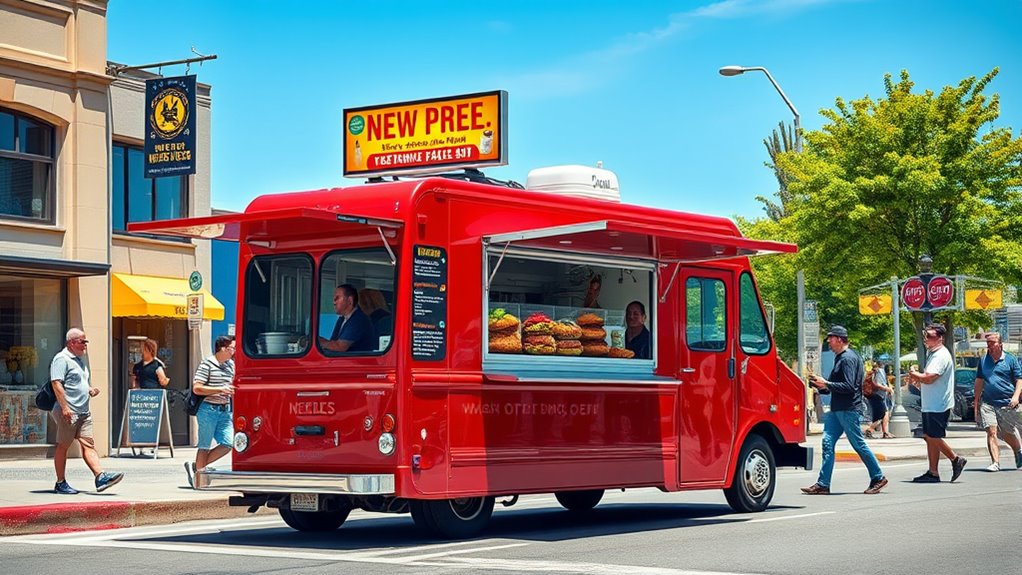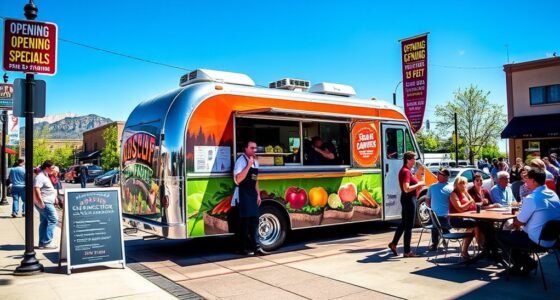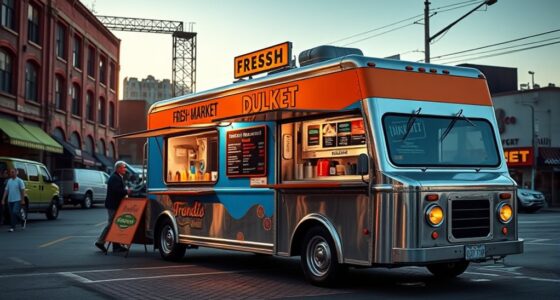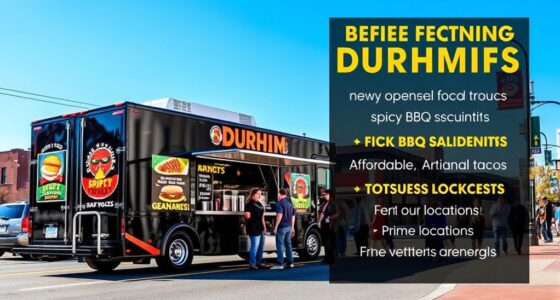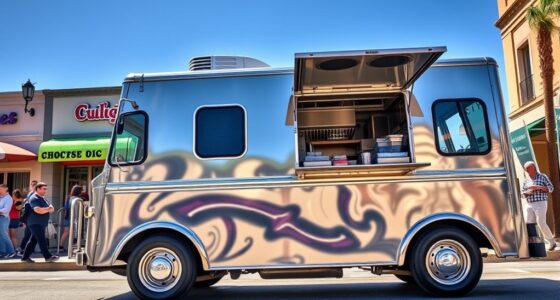To start a food truck in Brookings, South Dakota, you’ll need to secure permits like a city-specific license ($75–$100 annually), South Dakota license, and liability insurance ($1 million coverage). You must park in approved areas like downtown or parking lots, following distance and time limits. Budget for costs such as insurance, inspections, and permits. Successful marketing involves social media, community events, and loyalty programs. If you keep exploring, you’ll find useful tips to help you launch smoothly.
Key Takeaways
- Obtain necessary permits, including a city-specific food truck license ($75–$100) and South Dakota state licenses, to operate legally in Brookings.
- Park in approved zones like downtown (excluding Main Avenue), municipal lots, or parks with proper permissions and adhere to parking guidelines.
- Budget for costs such as permits, insurance ($1,500–$3,600 annually), inspections, and vehicle registration.
- Ensure compliance with health and safety regulations, including waste disposal, grease trap inspections, and proper signage.
- Use social media and community engagement to market your food truck, participate in local events, and build customer loyalty.
Securing the Necessary Permits and Licenses
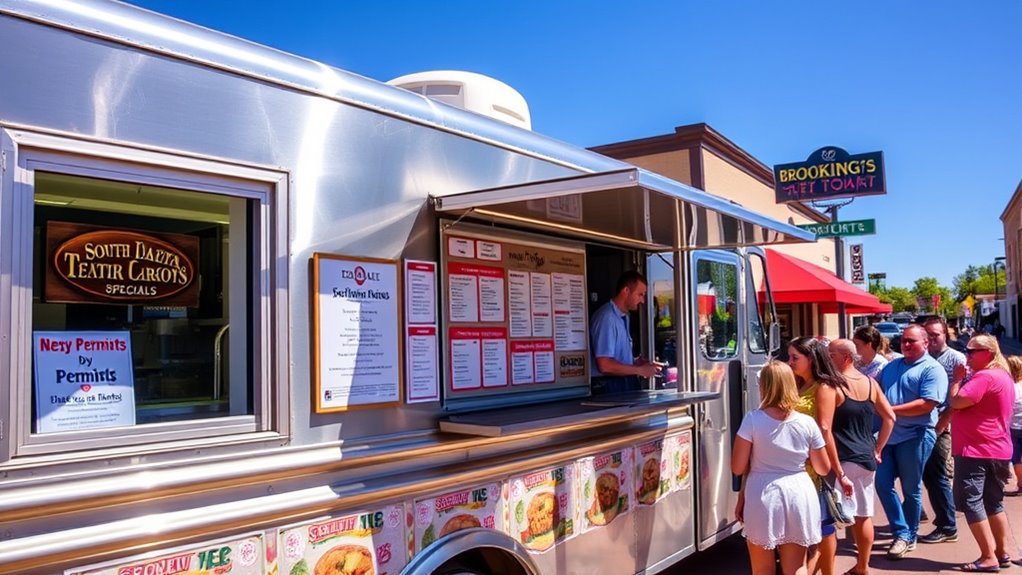
To legally operate a food truck in Brookings, you need to secure several permits and licenses. First, complete the city-specific food truck permit application, including a photo of your truck and a $100 fee payable to the City of Brookings. You must also submit a valid South Dakota State Mobile Food Service License and a current State Sales Tax License. Additionally, obtain a City Food Truck Vendor License, which must be displayed on your truck at all times, and ensure compliance with Brookings City Ordinance regulations. You’ll also need to provide a Certificate of Liability Insurance with at least $1 million coverage, naming the city as an insured party, and sign a Hold Harmless Statement. Understanding the importance of prophetic dreams in spiritual contexts] can be beneficial for those seeking additional guidance in their entrepreneurial journey. Supported browsers include modern options like Google Chrome and Mozilla Firefox, which help ensure your application process goes smoothly. These steps confirm your legal operation and protect both you and the city.
Understanding Location and Parking Guidelines
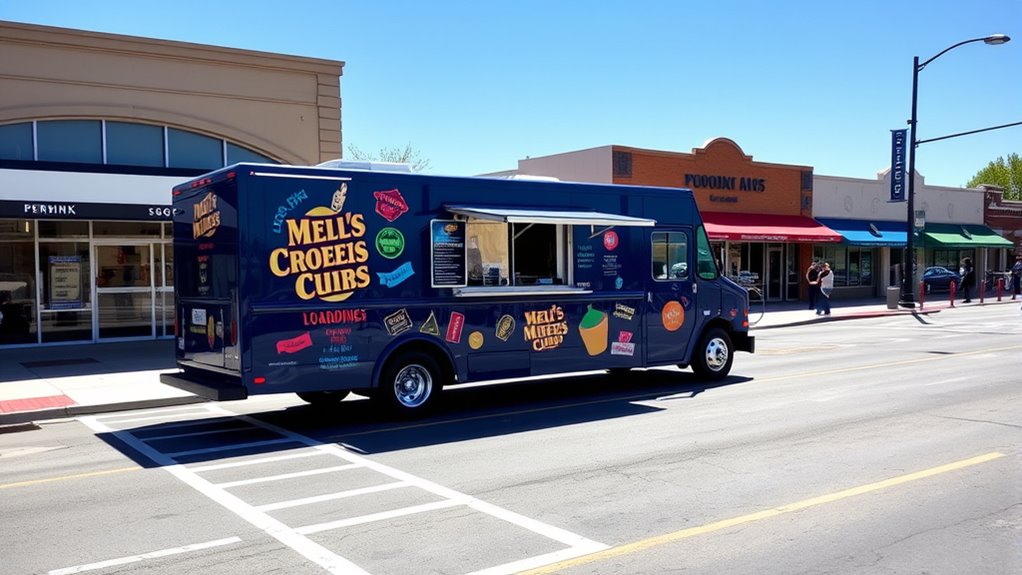
Finding your way through parking and location rules is essential for operating your food truck legally and smoothly in Brookings. You need to choose approved spots carefully to avoid fines or permit issues. You can park in the downtown zone, excluding Main Avenue, or on private properties in industrial or business zones with owner permission. Municipal parking lots are available if you get explicit approval, and city parks require special permission. However, avoid Main Avenue, SDSU property without authorization, residential street parking, or private residential properties. Keep your truck within two parallel or three diagonal spaces, facing the sidewalk, and stay at least 20 feet from crosswalks. Remember, parking is limited to two hours, and permissions from city officials are necessary for certain locations. Violations carry penalties up to $200. Proper space utilization ensures your food truck operations remain compliant and efficient.
Budgeting for Costs and Fees

To get your food truck up and running in Brookings, you need to budget for permits, insurance, and licensing fees. These costs vary and can add up quickly, so understanding each expense helps you plan effectively. Keep in mind that inspection and other additional expenses also play a role in your overall budget. Local regulations in Brookings may influence permit costs, making it important to research specific requirements before starting your business. Additionally, understanding Glycolic Acid benefits can help you incorporate skincare options for your staff or customers, enhancing the overall experience.
Permitting Fees Overview
Budgeting for food truck permits in Brookings involves accounting for several fees and potential costs. The annual Food Truck Vendor License costs $100, while temporary merchant licenses range from $50 to $75 annually, depending on the type. You must display the license visibly when vending. Permits are required only in designated zones; some streets and residential areas are off-limits. Additional costs include: Food safety training and certification requirements for food handling, State motor carrier permits ($60 annually or $25 per trip), Bonds (minimum $500), refundable after tax payments, Fees for vending in municipal parking lots and parks, Possible temporary or special event fees. Other expenses such as compliance with health regulations should also be considered to ensure smooth operations. Ensure you budget for these, as well as other related expenses, to stay compliant and avoid surprises. Proper planning helps you allocate funds efficiently and operate smoothly in Brookings.
Insurance and Licensing Costs
Planning for insurance and licensing costs is essential to guarantee your food truck operates smoothly and stays compliant in Brookings. Insurance premiums typically range from $125 to $300 per month, totaling $1,500 to $3,600 annually. Full coverage packages can cost between $2,500 and $5,500 yearly, with higher rates in larger markets. General liability insurance usually costs $385 to $1,900 annually, while commercial auto coverage runs from $2,500 to $4,200 yearly. Property coverage for trucks and equipment is around $300 to $550 annually. Licensing fees vary by municipality but generally fall between $50 and several hundred dollars annually. Vehicle registration, food handler licenses, and additional certifications can add a few hundred dollars to your total expenses. Proper insurance coverage is crucial to protect your investment and ensure your business remains compliant with local regulations. Additionally, understanding business licensing regulations helps avoid potential fines and operational disruptions.
Inspection and Additional Expenses
Understanding the various inspection fees and compliance costs is essential for keeping your food truck operations in Brookings on track. You’ll face several expenses beyond licensing, such as:
- Grease trap inspections costing $18 for initial checks and $51 for re-inspections if needed.
- Wastewater tap installation fees of $110 for 4” or 6” taps.
- Surcharges for wastewater discharge, including $0.43 per pound of BOD, $0.40 per pound of TSS, and $1.60 per pound of TKN.
- Sidewalk and curb ramp inspections at $25 each, plus potential fines up to $200 daily for violations.
Additional costs may include waste disposal permits, utility charges, and regular inspections to maintain compliance. Budget carefully for these ongoing expenses to avoid fines or disruptions. Incorporating regulatory compliance measures early can help prevent unexpected costs down the line.
Ensuring Menu Compliance and Health Regulations
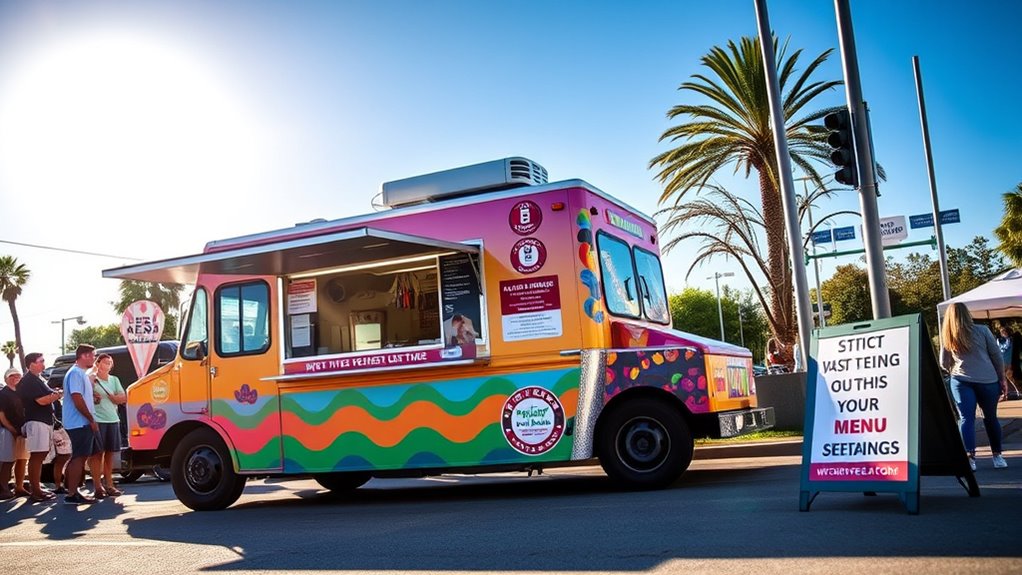
To guarantee your food truck stays compliant with Brookings and South Dakota health regulations, you need to carefully design your menu and food handling procedures. All foods must be prepared inside the truck or sourced from approved suppliers, especially hazardous items like meat, dairy, and seafood, which require strict temperature controls. Limit your menu to non-potentially hazardous foods if possible to simplify safety requirements. You’ll need to submit layout plans for cooking and storage areas for approval at least 30 days before construction. Maintain a safe water supply and proper wastewater tanks. Follow sanitation standards, use gloves or utensils instead of bare hands, and keep cold foods below 41°F and hot foods above 135°F. Prevent cross-contamination by proper separation of raw and cooked ingredients. Employing offensive security measures such as vulnerability assessments can help identify and mitigate potential risks related to food safety and compliance.
Effective Marketing and Customer Engagement Strategies
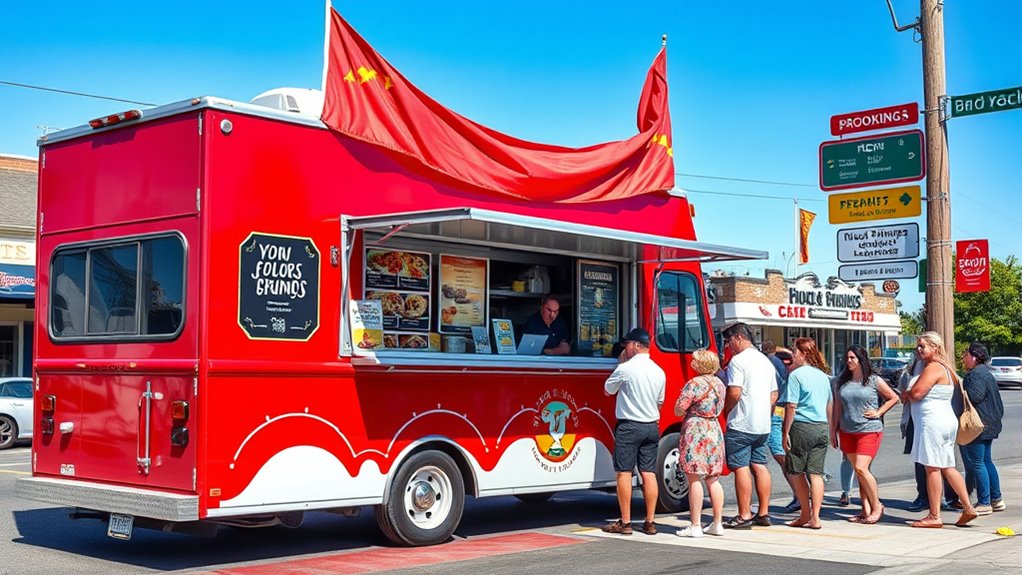
Effective marketing and customer engagement are essential for your food truck’s success in Brookings. Leveraging social media is key, with 68% of food trucks regularly promoting their business. Facebook is the top platform, used by 75%, while Instagram, TikTok, and Snapchat help reach Millennials and Gen Z. These campaigns can boost sales by 20% and help customers discover your truck. Participating in local events and festivals increases visibility, with 80% of trucks attending at least three annually. Engaging in community activities builds loyalty and encourages direct interactions. Implementing loyalty programs, with over 50% of trucks using them, can raise repeat visits by 30%. Use data analytics and storytelling to refine your marketing, foster emotional connections, and maximize your truck’s presence. Understanding regional divorce statistics can help tailor your promotional strategies to the local demographic landscape.
Navigating Operational Regulations and Restrictions
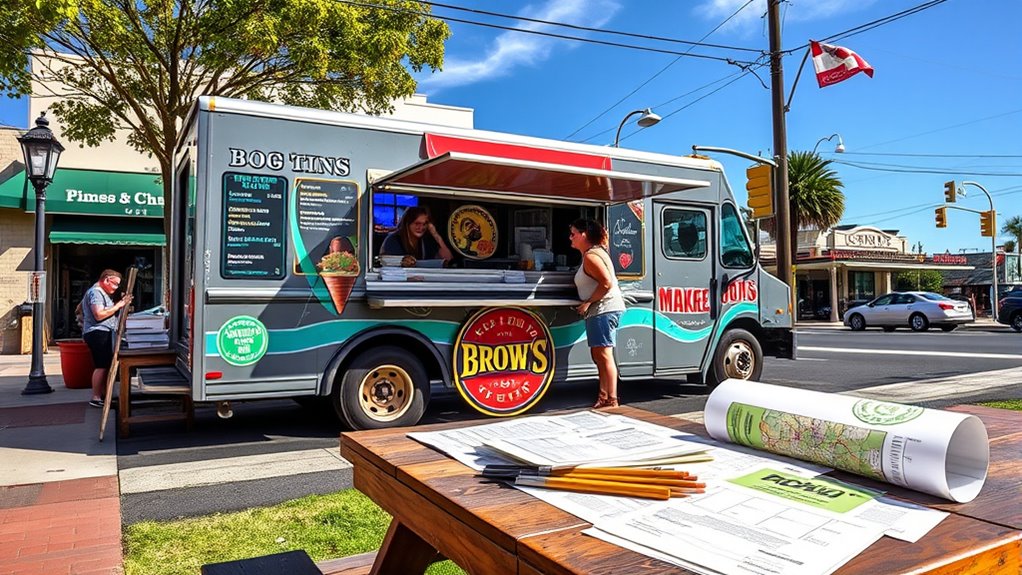
Steering operational regulations and restrictions is essential to running a successful food truck in Brookings. You need a food truck vendor license from the city, costing around $75 to $100 annually, with requirements like a State Sales Tax License and vehicle photos. You can operate in designated areas such as the Downtown zone (excluding Main Avenue), municipal parking lots, and parks, but you must get approval for each location. You must follow parking rules, keep a minimum 20-foot distance from crosswalks, and make sure your serving window faces the sidewalk. Compliance with South Dakota health standards is mandatory, including sanitation, safe food handling, and inspections. Also, adhere to noise, signage, and accessibility regulations, or face penalties for violations. Understanding testing methodologies can help ensure your compliance processes are thorough and effective.
Frequently Asked Questions
Can I Operate a Food Truck During Special City Events in Brookings?
Yes, you can operate your food truck during special city events in Brookings, but you need to get proper approval. You must secure permission from city authorities and event organizers, follow health and safety regulations, and choose approved locations like downtown zones or parking lots. Make sure to comply with parking restrictions, maintain safety standards, and coordinate your setup to avoid obstructing crosswalks or business entrances.
Are There Specific Signage Restrictions Beyond Electronic Signage Limitations?
Did you know Brookings enforces strict signage rules? Beyond electronic signs, you can’t put signs off your truck or block pedestrian pathways. All signage must be fixed directly on your vehicle, non-obstructive, and compliant with city and state codes. No hanging or projecting signs are allowed without special permits. Violations could cost you up to $200 daily, so you must follow these rules closely to keep your food truck running smoothly.
What Are the Penalties for Permit Violations or Non-Compliance?
You’ll face serious penalties if you violate permit rules or fail to comply. The city can revoke or suspend your permit immediately, especially for prohibited conduct. You could be fined up to $200 per day for each violation, and repeated infractions increase financial and legal risks. Additionally, improper refuse disposal or unauthorized locations can lead to fines, permit suspension, or even legal action, so staying compliant is essential.
Is There a Waiting Period for Permit Approval After Submission?
Much like waiting for dial-up internet to connect, you might wonder about the permit approval wait time. In Brookings, there’s no fixed timeline, but it can take anywhere from a few days to several weeks. The process depends on application completeness, department reviews, and compliance with city rules. Make sure all documents, including insurance and state licenses, are in order to avoid delays. Patience is key as your permit moves through the review stages.
Can I Operate Multiple Food Trucks Under a Single License?
You can’t operate multiple food trucks under a single license in Brookings. Each truck needs its own City Food Vendor License and South Dakota Department of Health approval because inspections, safety standards, and operational rules apply individually. This guarantees compliance with health and safety regulations, reduces risks, and aligns with local laws. Expect to pay separate fees, obtain multiple permits, and meet all requirements for each truck you plan to run.
Conclusion
Starting your food truck journey is like planting a seed in rich soil—you’ll need the right permits, location, and planning. With patience and dedication, your dream will grow into a vibrant, bustling hub of community and flavor. Embrace each challenge as nourishing rain, helping your venture blossom. Stay committed, adapt, and watch your passion transform into a beloved local staple, spreading joy just like a well-tended garden that blooms year after year.
